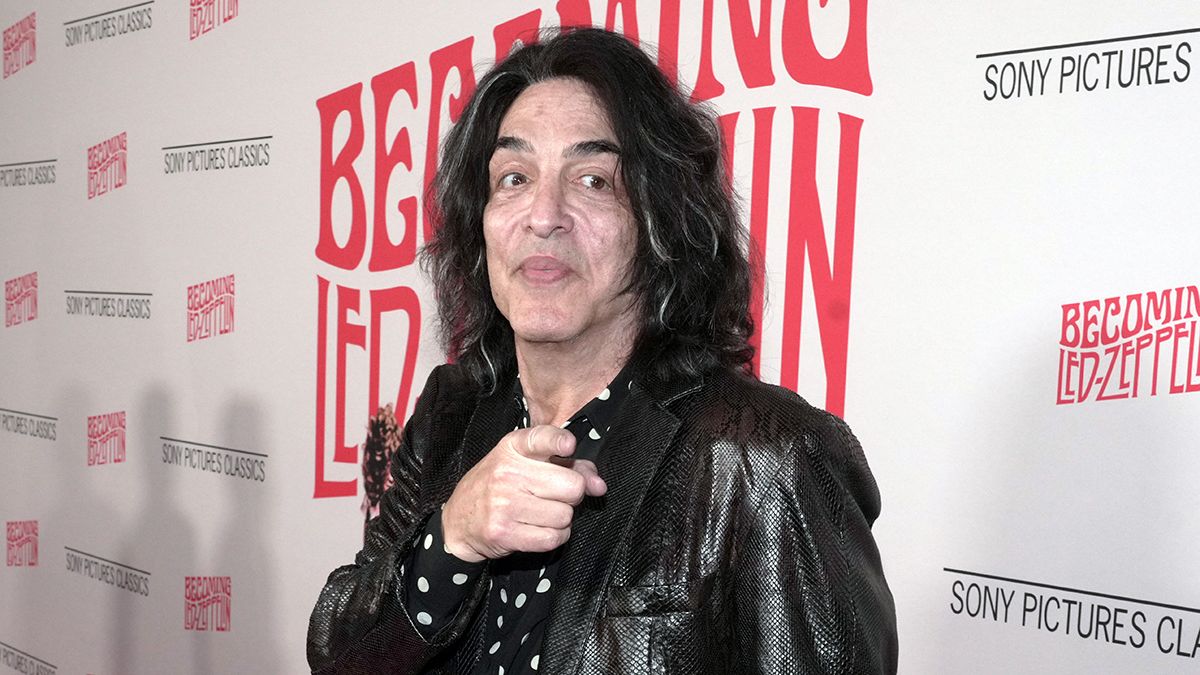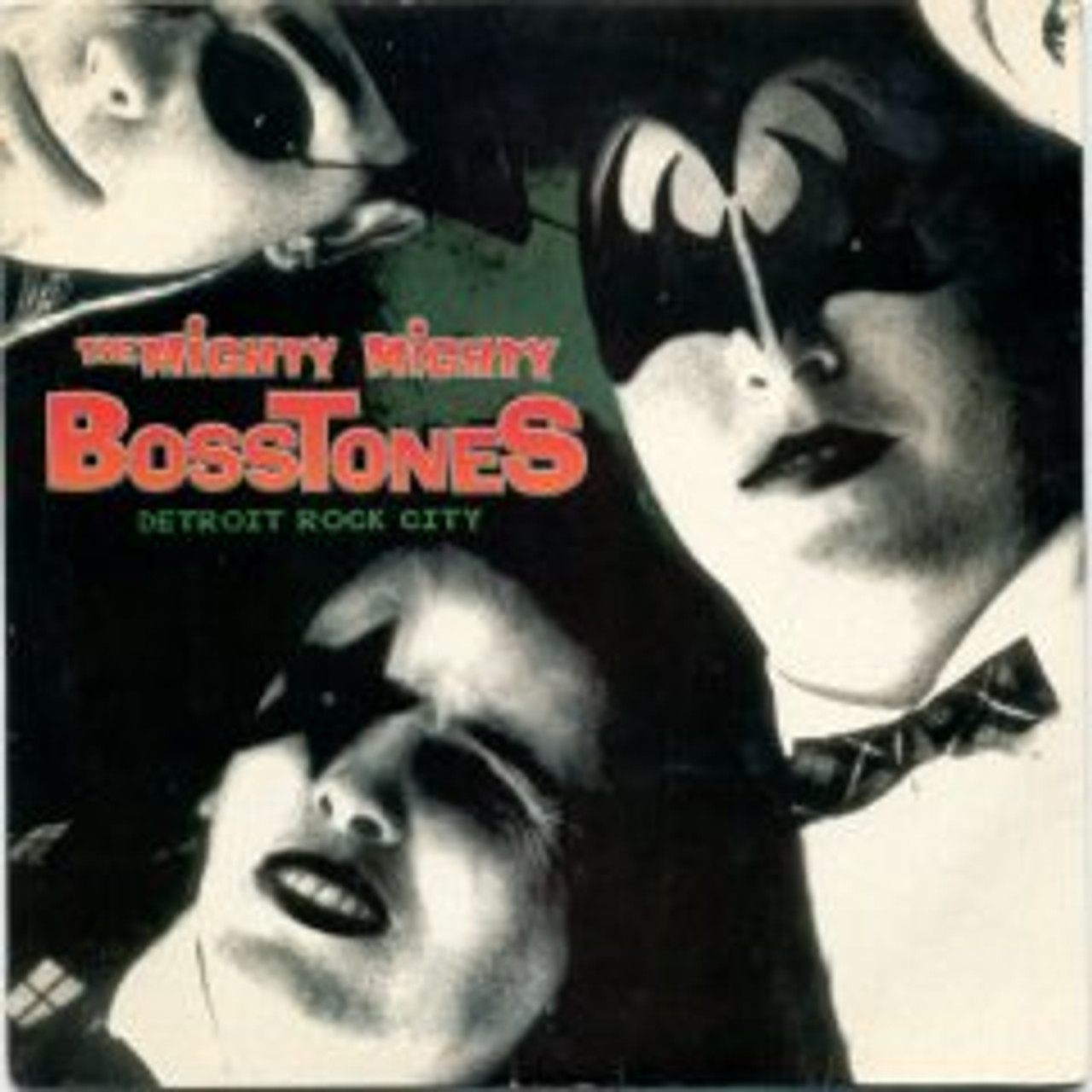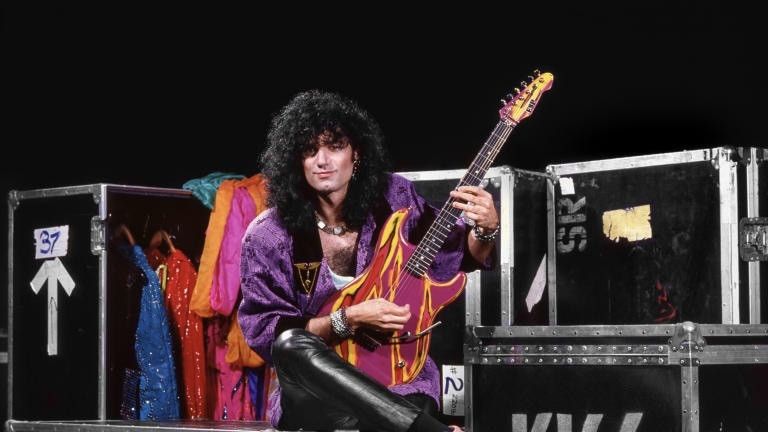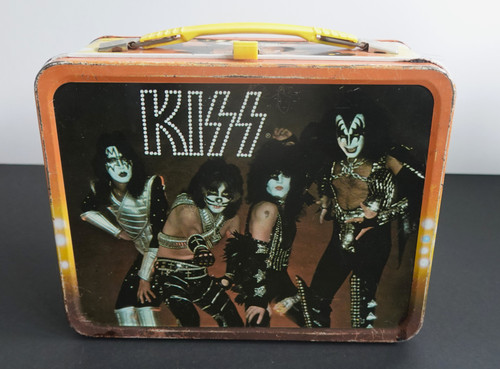We recently picked this up in a collection. See photos for condition. Definitely the real deal. There is rust on the surface throughout. If you have never owned one this would be a good opportunity to fill that void in your collection. Includes the thermos but it has started to come apart. See photos.
Author Archives: Steve Stierwalt
KISS Conquers Winterland 50 Years Ago Today; Vintage Footage Streaming
KISS Tokyo, Japan Concert 01/31/95
Space Frehley COMING TO YOU IN 2025! Check out my video, Curly
Reach out to Space Frehley for bookings here: spacefrehleyband@gmail.com
PAUL STANLEY Discusses His Relationship With KISS Bandmate GENE SIMMONS – “I Take Things That He Says With A Grain Of Salt, And I Think Others Should Too”
Best charting hit for KISS didn’t even feature Paul Stanley on lead vocals
KISS is undoubtedly one of the biggest and most famous rock and roll bands in the genre’s history. They had a huge impact on what rock music evolved into in the 1980s.
The band first hit the charts in 1974 with a song appropriately named “Kissing Time.” For the rest of that decade, they became famous for unapologetic rock anthems like “Rock and Roll All Night,” “Calling Dr. Love,” and “Shout it Out Loud,” among many others.
Apart from the music itself, they were famous for never appearing on stage without their signature face paint. It kept their faces unknown to the public and created an air of mystery about them.
What was KISS’ highest charting song and who sang it?
In 1983, just as the Hair Band Era of rock and roll took off, KISS released “Lick It Up.” Ironically, it was the first time they went sans make-up, just as other bands like Motley Crue, Poison, and others were donning makeup as part of their look.
In the mid-to-late-eighties, the band enjoyed moderate success with songs like “Lick It Up,” “Heaven’s on Fire,” “Tears Are Falling,” and “Reason to Live,” as well as a handful of others. Most of these songs firmly made it into the Billboard Hot 100, but none cracked the top 40.
In 1990, they released the ballad “Forever.” It became their second-highest charting song, reaching as high as number eight.
In 1976, the band released their terrific rock anthem single, “Detroit Rock City,” but a ballad on the B-side of that single that became their highest-charting song of all time. That song was “Beth.”
Drummer Peter Criss had previously been in a band called Chelsea and had co-written “Beth” with a member of that band, Stan Penridge. That band never recorded it, so Criss brought it with him. There is a lot of controversy over just how much input Criss had in the writing of the song, according to JimBeviglia of American Song Writer.
Regardless of how much writing Criss did on the song, he sang lead vocals when KISS recorded it. The song was a big hit and peaked at number seven on the charts in September 1976.
The success KISS had with “Beth” became a blueprint for rock bands in the 1980s. Bands would record a record full of rock and roll, with a couple of ballads mixed in. These ballads seemed to be some of the best charting songs for these bands. Think about Motley Crue’s “Home Sweet Home,” Poison’s “Every Rose Has it’s Thorn,” Dokken’s “Alone Again,” and Guns N’ Roses’ “Sweet Child O’ Mine.” It was a formula that worked over and over throughout the eighties.
Ace Frehley SIGNED KISS Stern Pinball Machine Backglass High Resolution Mirror at KISSArmyWarehouse.com!
Signed by Ace Frehley January 2024 at a private signing in Nashville, IN. Includes our Certificate of Authenticity. Signed in white paint pen. This looks amazing in person!
Mirrored screen print glass (not a translite) with high resolution trans material mounted to glass. Very rare and high quality. This looks mint to us. Can be used as decoration, and as a replacement back glass for Stern pinball machine. Measures 19×26 inches.
KISS Backstage on the Dynasty Tour 1979 from Madison Square Garden
Paul Stanley recalls the ‘epiphany’ moment of seeing Led Zeppelin live in 1969

Former KISS frontman Paul Stanley has recalled the life-changing experience of seeing Led Zeppelin live in concert in 1969.
Becoming Led Zeppelin, the first officially sanctioned film about the legendary English rock band, premiered at the TCL Chinese Theatre in Los Angeles last night (28th January), and KISS rocker and keen Led Zep aficionado Paul Stanley was among those in attendance.
Asked on the red carpet what Led Zeppelin means to him, Stanley said that seeing them live in concert as a teenager set him on the path to become a rock star.
“Led Zeppelin for me was a religious experience,” Stanley enthused. “The first time I saw them was 1969 and it was an epiphany for me because I saw how great something can be.”
Other attendees at the LA premiere included Dirty Honey, Eagles of Death Metal’s Jess Hughes, members of Stone Temple Pilots, The Black Crowes, Anthrax’s Scott Ian, Garbage, actors JK Simmons and Michael Rosenbaum, and John Bonham’s grandson Jager Henry Bonham.
Eagles of Death Metal’s Jesse Hughes spoke about what he hoped young music fans would learn about Led Zeppelin from the film: “That it’s actually important to have integrity. That’s one of the things you learn… No matter what, they maintained an integrity that is unparalleled. It’s possible to be honest, and be a shark at the same time.”
Anthrax guitarist Scott Ian shared his favourite Led Zeppelin song: “‘In My Time Of Dying’, that might be Bonham’s sickest drum track.”
Kiss – Detroit Rock City (Live On Letterman/2012)
KISS Music From The Elder is Reviewed in Sounds by Geoff Barton
Rock Legend: KISS co-founder Simmons celebrates solo venture

The Grammy Award-nominated and Rock and Roll Hall of Fame-inducted rock group KISS took the stage on Dec. 2, 2023, at Madison Square Garden for the last stop of the band’s End of the Road World Tour — marking the group’s final performance in its five-decade history.
And while the band’s legacy will continue on via digital avatars for virtual stage shows, slated to start up in 2027, the live music still lives on — particularly with founding co-member, bassist and co-lead vocalist Gene Simmons, who has been playing out with his own band since last April.
On May 3, he and his group — the Gene Simmons Band — will make its debut at the Beaver Dam Amphitheater, kicking off the venue’s 2025 First United Bank & Trust Concert Series.
It’s been just over two years since Simmons, who turned 75 in August, was in front of the 20,000-person crowd in New York City as “The Demon” alongside fellow founding member Paul Stanley, longtime drummer Eric Singer and the group’s final lead singer and guitarist Tommy Thayer — a moment Simmons described being “a combination” of “satisfaction, pride and, of course, bittersweet” feelings.
“… Imagine you’re climbing the unclimbable mountain to get to the top of Mount Olympus. When you get up there, you’re beaten up by the weather, the air is thin up there …,” Simmons said. “… Even though we won in following our own rules and so on — … not being part of important musical genres that came and went … — there’s nothing I would have changed, I have to say.
“You have to know when it’s time to say thank you,” Simmons said.
Born in Haifa, Israel, Simmons — birth name Chaim Witz — legally emigrated to the United States with his mother Flora Klein, a Holocaust survivor, in 1958 at the age of 8, settling in the borough of Queens in New York City.
Shortly after, Simmons, who did not speak “a word of English,” became exposed to what was playing on the radio and became infatuated with the sounds of Chuck Berry, Little Richard and Fats Domino.
“I couldn’t stop listening (to) that music,” he said. “Not so much the pop music; it was fine. I enjoyed it, but instantly forgettable like a sugar high. … It didn’t stick to your ribs.”
Simmons, who went on to speak at Berry’s funeral in April 2017, recalls being emotional that day in reminiscing about hearing Berry’s music during his youth.
The day Gene Simmons first encountered rock ‘n’ roll: “Never seen a television set”

As silly as it sounds, it’s genuinely hard to imagine a world without rock ‘n’ roll—a time before the term “rock star” existed, before pop music was taken seriously as an art form. A time before you could witness a man dressed like a sex dungeon Lord Zedd flying around a stadium stage, shredding on a burning bass guitar. Truly, what were we as a culture before Kiss entered the picture? Fittingly, their frontman, Gene Simmons, belongs to a generation that (vaguely) remembers that time.
Born Chaim Witz in Haifa, Israel, he didn’t move to America until he was eight years old when his parents split, and his mother decided to emigrate to Queens, New York. When asked by Goldmine Magazine to put together a list of the ten albums that changed his life, in true Simmons fashion, the list began with a spiel explaining the exact context behind why those records changed his life.
Most of them come from the pre-to-early rock and roll period, which is the period of time that inspired Simmons the most. As he puts it, “I came to America with my mother in 1958, and I had never heard of rock and roll, and I actually had never seen a television set. We didn’t have one. We were very poor in Israel, and I never could have imagined that there was a magic box where people flew through the air and there were monsters and the Empire State Building and King Kong.”
The very idea of pop culture and youth culture was more or less new to the young Simmons. When he puts it like that, it’s easy to see where the very concept of Kiss comes from. Imagine moving to a new country and seeing all this new culture for the first time. Not only that, but you do so at an age where you’re old enough to understand it but young enough to be the target audience.
What else is Kiss but all that inspiration coming together in one place? Hearing the music of Chuck Berry and Elvis Presley and having it have just as much effect as reading a Fantastic Four comic or watching Godzilla fight Mothra on TV. Going to the movie theatre for the first time and watching Dr No or The Music Man, then coming home to see this bunch of Limeys on Sullivan calling themselves The Beatles.
After all, for all their fearsome image, Kiss’ music never really got past being a mix of Chuck Berry and early Beatles with a bit of glam heaviness thrown in for good measure. That is the nature of inspiration, though. We are, consciously or unconsciously, inspired by everything that surrounds us. Sure, Simmons rhapsodises about Little Richard and Ray Charles, but the music alone doesn’t bring Kiss to life.
The best part of it is that inspiration never stops. While Simmons moved to America and discovered all this for the first time, that doesn’t make his experience more or less meaningful than anyone else. It just meant he decided that all these things that were making his world a bigger, more exciting place could coexist as one entity. Really, anyone can do that, no matter where or when they’re from!
“I didn’t know it was going to be loved by so many people. I didn’t even want to record the song!”: How a famous guitarist scored a surprise solo hit

When the four members of Kiss made solo albums at the height of the band’s popularity in 1978, few people would have bet on Ace Frehley’s album being the most successful of them.
Lead guitarist Frehley hadn’t sung a lead vocal on a Kiss song until a year earlier.
In this band, it was rhythm guitarist Paul Stanley and bassist Gene Simmons who wrote and sang most of the songs – the most notable exception being the hit ballad Beth, which had been written and sung by drummer Peter Criss.
The Kiss solo albums were released simultaneously on 18 September 1978.
Paul Stanley’s was the closest to a regular Kiss album, with plenty of melodic hard rock songs.
The Gene Simmons album had some great Beatles-inspired tunes such as See You Tonite and featured A-list guest stars including Donna Sunmmer, Aerosmith guitarist Joe Perry and Simmons’ then-partner Cher.
The Peter Criss record was middle-of-the-road pop rock, sung in the style of Rod Stewart.
And the Ace Frehley album was a full-on hard rock banger.
But the guitarist also had an ace up his sleeve: a cover version of a glam rock song that would give him a huge hit single.
The song was New York Groove, written by former Zombies and Argent star Russ Ballard, and originally a top 10 UK hit for British band Hello.
As Frehley now recalls to MusicRadar, he didn’t think much of New York Groove until his producer Eddie Kramer talked him into recording it.
“I didn’t even want to record the song!” Ace laughs. “I didn’t think it was indicative of the other songs on my album. But Eddie Kramer kept pushing me to do it.”
Certainly, Kramer was a man worth listening to. He had worked with Jimi Hendrix, Led Zeppelin, The Rolling Stones and The Beatles.
Kramer had also enjoyed huge success with Kiss – producing the band’s breakthrough concert recording Alive! and its follow-up Alive II, plus the studio albums Rock And Roll Over and Love Gun.
For his solo album, Frehley enlisted Kramer as part of three-man skeleton crew.
“It was me, Eddie Kramer, and Anton Fig on drums,” Ace recalls. “We cut the record at a rented mansion in Connecticut.
“And we set up my amps in different rooms for different ambience. That was different than with Kiss.
“I especially liked using the library of the mansion because it was all wood and had a nice resonance and vibe, man. I recorded a lot there. It had a natural echo and a lot of natural ambience.
“I didn’t get to do that as much with Kiss, but while doing my solo album I really learned to use natural space because it sounded so great. The untrained ear might not be able to tell—but I can pick the difference out nine times out of ten.
“It was organic. It just happened. I loved being able to make an album like that, though I’ve never quite come close to it, save for my last album, 10,000 Volts. The fact that we went into the unknown and didn’t know how we’d set it up really defined how my first solo album sounds.
“We experimented. I loved working with Eddie Kramer because he was willing to go the extra distance, take the time to do things, and get a natural ambience from a marble bathroom or a wood library.
“I remember putting mics at the entrance of the mansion hanging from the second floor. We got huge sounds – nothing else sounds like that. That’s not studio trickery – it’s a real and fucking huge natural echo from the hallways.”
After the sessions at the mansion had finished, Frehley moved operations to New York City, where Ace was born and where Kiss was formed. And fitting it was there that he recorded New York Groove.
As he recalls: “We moved to the studio at Radio City Music Hall—which doesn’t exist anymore. We were doing overdubs on other tracks, and fine-tuning, that’s when New York Groove happened.
“I stepped out of my comfort zone with the funky guitar. I experimented. And that stomping around sound? That’s actual people stomping on actual boxes. Beyond that, I don’t really remember much else.
“It was just me, a Les Paul, and a Fender amp. I turned it to ten and just did what I always do. It was a true organic song—and that’s what made it work, I think.”
Kiss – “Alive!” Ultimate Album
KISS Mighty Bosstones Detroit Rock City 45 Single at KISSArmyWarehouse.com!

This is in awesome condition and very hard to find. The vinyl seems to be close to mint, no obvious scratches or scuffs. The vinyl is green and see through! Very cool! This is an original Mercury release with the code 858 894-7.
KISS – Paul Stanley Rock Against Drugs (RAD) commercial – 1986
Did the makeup make Kiss better or worse?
One of the most defining moments of Kiss was when Black Sabbath took them on their first world tour. Sabbath were a definitive band that pushed the boundaries of music and was always keen on giving listeners something new. As pioneers of the musical revolution, it only made sense that Black Sabbath would take fellow innovators on the road, and that’s what they did with Kiss.
What they got turned out to be much more than they bargained for, as Kiss proved to be much more than just a band with a big sound. They put theatre at the heart of everything they did, keen on stimulating a crowd’s senses, not just stopping at the sound but giving them something awe-inspiring to look at in the process.
“Kiss was the first to use pyro,” said Geezer Butler, looking back on when he first hit the road with the band, “You’ve never seen that. I mean, the shock of that. And they were supporting us, so they weren’t even headlining. I went out and watched them. There were all these flames coming out the stage and everything. It was like, ‘Oh my God, what’s going on here?’”
While the pyrotechnics that Kiss used were certainly a talking point, one of the most famous aspects of their live show is the makeup they wear. The inspiration behind Halloween costumes ever since, Kiss’s black and white makeup has become the stuff of legend, as they are one of the most recognisable bands on the planet.
When Paul Stanley was asked why the band opted to wear makeup, naturally, he said it was to entertain. However, there was a deeper meaning attached, as Kiss felt the idea of brand identity didn’t exist in music as much anymore.
“Those ‘60s British groups all looked like real bands. No member of The Beatles could have fit into the Stones. No member of The Who could have fit been in the Dave Clark Five,” he said, “You had unified images of those bands, and at the same time, there was an emphasis on the individual members.”
He has a point. When you think of the members of Kiss, you can name them all and the characters they performed as, and as a result, you pay more attention to the individual styles and attributes that each member brings to the band. They also have a solid sense of brand identity, as every Kiss album, aside from some where they took the makeup off because it had such a strong image fronting it, you recognised the album as Kiss even if they had gone down a different direction musically.
Gene Simmons once said that he enjoyed their music, which could be traced to them even if it varied in style. “We also took pride in having the same freedom The Beatles had,” he said, “Their philosophy was, ‘No matter what kind of music we do, it’s still The Beatles’. That’s what was amazing about them… The Beatles were not trapped in that way. They could do music hall, psychedelia – anything – and they did. Yet somehow it always sounded like The Beatles.”
With this freedom, the band had more freedom to write whatever they wanted, which made for exciting listening. Plus, it played into the stage show they put together. Kiss is easily one of the most famous live bands on the planet, and they owe a great deal of that to their makeup.
That being said, there is an argument for the fact that it acted as more of a hindrance to the band. Some people saw them as too theatrical and dismissed the music before they gave it a proper chance. They didn’t see the point in listening to Kiss as they didn’t take them seriously.
Overall, when you consider the success of the band and the varied sound throughout their discography, it’s hard to look at anything Kiss has done and say it was ill-advised. Every aspect of them, be it the way they sound, look or perform, has contributed towards them becoming one of the biggest bands on the planet. So with that in mind, the makeup was a fantastic idea.
Peter Criss of KISS, classic 1978 radio interview for his solo album
Bruce Kulick Names Piece of Gear He Abandoned After Kiss and Why It Didn’t Work for Grand Funk

Throughout Bruce Kulick‘s career with Kiss, which ran from 1984 to 1996, he always had specific guitars on standby to fit the group’s hard-rocking needs. But when it came to his post-Kiss projects, he had to rethink the selection of his instruments.
During an interview with AM/FM Magazine, Kulick tackled this topic and discussed which welcomed piece of guitar gear in Kiss was an absolute no-no when he played in Grand Funk.
“I was kind of like one of [ESP Guitars’] earliest endorsers in rock,” Kulick explained (transcribed by Ultimate Guitar). “I played plenty of the one pickup bolt-on, y’know, ‘Super Strats,’ as I call them. But then I evolved into their other models, like Horizons and different things. And then I challenged them, ‘Make me an Explorer. Make me a Les Paul-looking guitar.'”
Kulick then explained the piece of guitar gear that was in demand during his tenure with Kiss. But, was never ever utilized in his next longest-tenured gig, with Grand Funk.
“After Kiss, I didn’t use Floyd Roses a lot. I remember the band Union that I had [with ex-Mötley Crüe singer John Corabi]. I had a Vintage Plus Strat [with] three pickups, Floyd Rose, from ESP. That was for the whammy bar stuff.”
“Then I’m in Grand Funk for 23 years. I did not need a whammy bar. It wouldn’t have been appropriate anywhere in their material because their fame came before it really became a fad and existed. So I kept true to that. Now, obviously, when I went off and did some things, I used a guitar that might have had a Floyd Rose.”
As with most hard rock guitarists of the ’80s, Kulick certainly used his Floyd Rose tremolo system, especially on Kiss tunes such as “Crazy Crazy Nights,” “Tears are Falling,” and “No No No,” among others.




